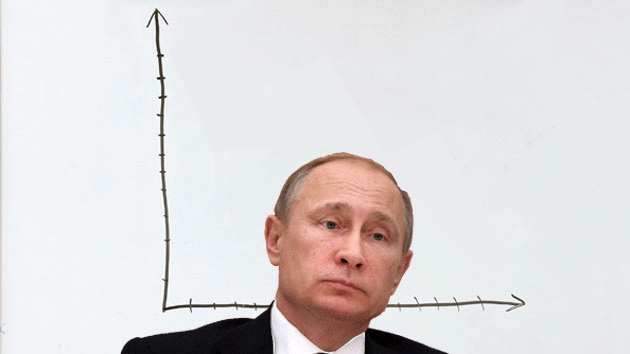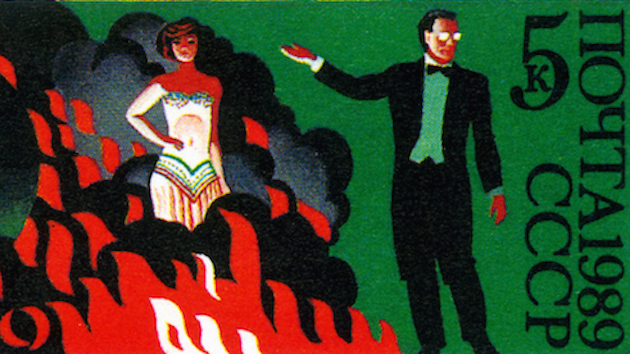
Early Tuesday morning, Russia made what may be a last-ditch effort to save its economy: the country’s central bank jacked up interest rates to try to prevent the ruble from plunging in value for the sixth time this year. But the currency hit record lows anyway, sparking worries of economic collapse—and political instability.
Click on a question below to read more about what’s going on in Russia.
Was raising interest rates the right choice?
What’s the reaction in Russia?
Have we seen this before?
The last time Russia raised its interest rates this high was during the 1998 financial crisis, sometimes called the “Russian Flu.” Declining productivity and a disadvantageous foreign exchange rate helped trigger the crisis. When demand for crude oil went down and Russian President Boris Yeltsin dismissed his prime minister, the fight to save the ruble was on. The central bank raised rates dramatically that May; the government defaulted on its loans a few months later. The Russian economy only bounced back once demand for oil rose.
Here’s Mother Jones‘ Kevin Drum on an earlier crisis:
Why did the Soviet Union lose control of its satellite states behind the Iron Curtain in 1989? Lots of reasons, but the proximate cause was a disastrous war in Afghanistan; plummeting oil prices; and a resulting economic crisis.
War, sanctions, an oil crash, and finally bankruptcy. And while history may not repeat itself, it sure does rhyme sometimes: 25 years later Vladimir Putin has managed to back himself into a situation surprisingly similar to the one that led to the end of the Soviet Union and the final victory of the West—the very event that’s motivated almost everything he’s done over the past few years. This is either ironic or chilling, depending on your perspective.
Was raising interest rates the right move?
Dean Baker, a director at the left-leaning Center for Policy and Economic Research, tells Mother Jones that he would have let the ruble keep falling. Now, the Russian economy is subject to harsh inflation and high borrowing prices just to try to preserve the national currency. “It further exposes the economy,” Baker says. “If they let the ruble keep falling, at some point people would want to buy it again. It would be a chance for economic growth.”
Others, like Ian Hague, a founding partner at a New York-based firm that oversees Russian stocks, believe that raising rates was the right choice to keep the Russian economy afloat. “This move symbolizes the surrender of economic growth for the sake of preserving the financial system,” he told Bloomberg News.
What’s the reaction in Russia?
Russian television channels are reportedly telling citizens that the weak ruble is good—that it will stimulate domestic production and make exports cheaper. And Russia is expected to keep blaming the West for the collapse; an opinion poll, translated by Time, confirms that most Russians are still happy to believe that.
But Harley Balzer, a professor at Georgetown University and an expert on Russian domestic politics and economy, spoke to a few Russians after the announcement: “People are really scared,” he tells Mother Jones. “The few Russians I’ve spoke to have been in a state of what I’d call shock.” And, he says, Moscow isn’t explaining what’s actually going on very well. “Signals coming out of Moscow have been contradictory…people don’t have enough information.”
Why is this happening?
Russia is being hit hard “primarily by the oil prices,” Baker says. Russia gets around half of its budget revenue from taxes on oil and natural gas, and as long as the price of oil is plummeting, its economy is likely to continue sinking.
Is it all about oil?
Not necessarily. An unbalanced pension system, inflation, and the harsh US and European sanctions have also damaged Russia’s economy in the past year. Sometimes, a less-valuable currency can help a country by making its products cheaper abroad, increasing exports. But Russia doesn’t have much domestic manufacturing, so it can’t take advantage of the ruble’s decline that way. “Russia doesn’t make anything,” President Barack Obama told The Economist in August. “They need to start making their own stuff,” says Balzer. “Right now they make stuff people don’t want to buy, they’re using foreign technology instead of their own. That’s silly.” Baker notes “There’s a lot of corruption there, that certainly precedes [Russian leader Vladimir] Putin. It all creates a very bad mix, and there’s not a good way out.”
What will Putin do?
The ruble’s collapsing value will definitely put pressure on Putin to explain himself and his plans to fix it. But some experts believe Putin might keep getting away with blaming the disaster on the West, at least for a while. “In the short term, he keeps blaming the West,” Balzer says. Putin is largely in control of Russian media sources, Balzer explains, and there is not enough outside information pouring in. “But this is not a short game, this is a long game,” he adds. Balzer predicts that in a year’s time, the sanctions will start hitting Russia much harder, and Russians are going to start asking more questions of their government. “Over time, that’s gonna stop working,” he says.
According to Balzer, Ukraine and the Baltic nations are already pointing out the flaws in Putin’s blame-the-West strategy. And, as the Russian people get more information, they’re bound to become disillusioned.
Michael McFaul, a political science professor at Stanford University and the former US ambassador to Russia, also believes Putin will “hold” the status quo rather than lash out or fold in response to the crisis. “I don’t see how more military aggression would help Putin domestically,” McFaul tells me in an e-mail. “Nor do I see Putin offering concessions in eastern Ukraine, first because that is not his character, and second because he must understand that it is Saudi actions, not Western sanctions, which are exacerbating his economic woes.” (Saudi Arabia’s refusal to cut oil production is perhaps the biggest factor in the huge decline in oil prices.) McFaul doesn’t think that lifting US sanctions would “stop the bleeding.”
What will happen next?
Balzer predicts that, after Russians get tired of Putin blaming the West for Russia’s own economic failures, the Russian leader might go back to the kind of policies he implemented in the first few years of his rule. In 2003, Putin shifted his economic policy drastically, towards renationalization and, in turn, corruption. He completely halted previous progressive market reforms. “Since [2003] they’ve had a lost decade,” Balzer tells me.
In the future, Balzer thinks that Russia will be forced to engage in “much more global integration,” and to placate foreign powers it has displeased in the past—such as the US and Europe. “They’ll have to get away from oil and gas, get away from things that fluctuate,” Balzer says. “They’ll have to start making their own stuff.”
McFaul predicts that there will be a “shakeup of [Putin’s] government.” He tells me “there is nothing more that investors would like to see than a return for someone like Kudrin to the government.” Alexei Kudrin is a former Russian finance minister who expressed concern about the Russian economy in an interview with CNBC in October. He resigned in September 2011 after more than ten years working for the Russian government. Many believed he was a stabilizing force, and had influence over Putin. He is considering returning to the government, but only if economic reforms are made.














